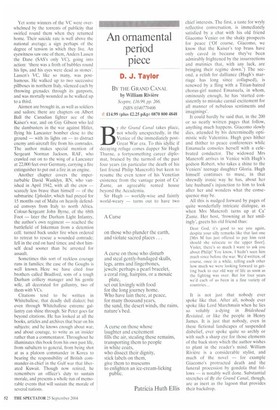An ornamental period piece
D. J. Taylor
BY THE GRAND CANAL by William Riviere Sceptre, £16.99, pp. 266, ISBN 0340770406 114.99 (plus £2.25 p&p) 0870 800 4848
By the Grand Canal takes place, not wholly unexpectedly, in the Venice of the immediately postGreat War era. To this idyllic if decaying refuge comes dapper Sir Hugh Thurne, a fortysomething career diplomat, bruised by the turmoil of the past four years (in particular the death of his fast friend Philip Mancroft) but keen to resume the even tenor of his Venetian existence from the vantage point of Ca' Zante, an agreeable rented house beyond the Accademia.
Sir Hugh — worldly-wise and faintly world-weary — turns out to have two A Curse on those who plunder the earth, and violate sacred places ...
A curse on those who disturb and steal gently-bandaged skulls, legs, arms and fingerbones, jewels: perhaps a pearl bracelet, a coral ring, hairpins, or a mosaic plate, set out lovingly with food for the long journey home.
Who have lain there, at peace, for many thousand years, the sand, the desert winds, the rains, nature's bed.
A curse on those whose laughter and excitement fills the air, stealing these remains, transporting them to people in white coats, who dissect their dignity, stick labels on them, give them to museums to enlighten an ice-cream-licking public. chief interests. The first, a taste for wryly reflective conversation, is immediately satisfied by a chat with his old friend Giacomo Venier on the shaky prospects for peace (`Of course, Giacomo, we know that the Kaiser's top brass have only caved in because they've been admirably frightened by the insurrections and mutinies that, with any luck, are bringing their regime down.) The second, a relish for dalliance (Hugh's marriage has long since collapsed), is renewed by a fling with a Titian-haired chorus-girl named Ernanuela, in whom, ominously enough, he has 'started consistently to mistake carnal excitement for all manner of nebulous sentiments and imaginings'.
It could hardly be said that, in the 200 or so neatly written pages that follow, anything much happens. Giacomo slowly dies, attended by his determinedly optimistic wife Valentina. Hugh goes hither and thither to peace conferences while Emanuela consoles herself with a celebrated conductor. The widowed Mrs Mancroft arrives in Venice with Hugh's godson Robert, who takes a shine to the Veniers' teenage daughter Gloria. Hugh himself continues to muse, in that shrewdly ironic way be has, about her late husband's injunction to him to look after her and wonders what the consequence may be.
All this is nudged forward by pages of quite wonderfully intricate dialogue, as when Mrs Mancroft turns up at Ca' Zante. Her host, 'frowning at her smilingly', greets his old friend thus:
Dear God, it's good to see you again, despite your silly remarks like that Last one [Mrs M has just offered to pay him rent should she relocate to the upper floori. Violet, there's so much I want to ask you about Philip? You know, I hadn't seen him much since before the war. We'd written, of course, once in a while, telling each other how much we were looking forward to getting hack to our old way of life as soon as the fighting was over. But for four years we'd each of us been in a fine variety of countries...
It is not just that nobody ever spoke like that. After all, nobody ever spoke like Lord Marchmain when he lies so volubly a-dying in Brideshead Revisited, or like the people in Henry James. It is just that nobody, even in these fictional landscapes of suspended disbelief, ever spoke quite so archly or with such a sharp eye for those elements of the back story which the author wishes to plant in the reader's mind. William Riviere is a considerable stylist, and much of the novel — for example Giacomo's protracted death and the funeral procession by gondola that follows — is notably well done. Substantial stretches of By the Grand Canal, though, are as inert as the lagoon that provides their backdrop.


























































































 Previous page
Previous page